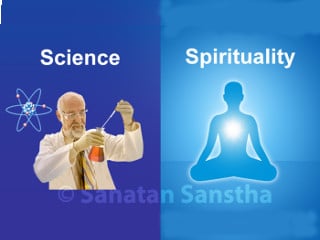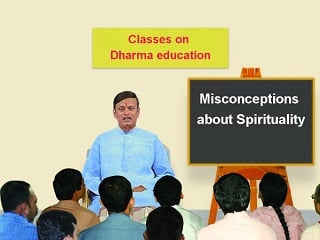Contents
1. Misconceptions about Spirituality
Most people specially the younger generation, have a lot of misconceptions about Spirituality. So let us first understand what these misconceptions are, that is what is not Spirituality.
1.1 Fear
30% of the population feels that if God and saints get enraged with them, they will be harmed. Many people as directed in letters which they have received in the name of saints or God, send twenty-five to fifty copies of them, with the fear that if they do not comply then they will incur a great loss. Similarly, people give alms with the fear that if a person in the garb of a mendicant is hurt, then he may wish one ill and may even curse. There is absolutely no reason whatsoever to harbour such fears. However, due to the fear that if one errs, a sin shall be committed and one will be punished by God for it, at least 30% people from society refrain from making mistakes. This is an indirect benefit of this school of thought.
1.2 Ignorance
There is no connection whatsoever between education which gives worldly pleasures and ignorance about Spirituality. Approximately 80% of the people from each of the following groups – illiterate, those with primary education, those with secondary education, graduates and post-graduates are ignorant about Spirituality, as they have no formal education in it. An example of such ignorance can be seen in the article, ‘The Ganesh idol from the aesthetic point of view’ which appeared in a local daily. In this article a famous artist writes, ‘The traditional Ganesh idol is considered as one of the most beautiful sculptures. I feel like congratulating the anonymous sculptor, the first to materialise this innovative idea into reality’. That Ganapati (Lord Ganesh) is an idea, is ignorance by itself. Deities like Ganapati are not imaginary, they really exist and even have a form. This is what that poor writer does not know.
-
A. Dr. Athavale was once invited to deliver a discourse on Spirituality at Mumbai. The organisers asked Him whether they should provide Him with a chaurang (a small square stool used during ritualistic worship) instead of a chair, whether the table should be covered with a saffron cloth and if an oil lamp (samai) was required beside Him. They were unaware that Spirituality does not lie in external decoration but in painting one’s inner self saffron [with detachment (vairagya)].
-
B. Sexuality and ignorance about Spirituality
1. On one hand, you advise me to practise Spirituality and on the other ask me to lead a normal sexual life and not to ‘refuse’ my spouse. Is this not contrary to Spirituality?
2. A woman suffering from depression, thought that her sexual desire had decreased in accordance with her age. In reality, it can decrease with advancing age, depression and spiritual progress.
-
C. ‘Those following the Path of Spirituality differentiated between Spirituality and the universe. They therefore ignored the universe considering it as the Great Illusion (Maya). Hence the very zeal for living was over. People became helpless and inactive and led a life devoid of activity under the pretext of attaining the Final Liberation (Moksha). This is not true Righteousness (Dharma).’ – Shri Arvind (The life of one following the Path of Spirituality should be beneficial for all creation.)
-
D. Those believing in destiny: It is incorrect to consider one believing in destiny, a coward. He alone is the true brave one and has the potential to become a saint.
1.3 Blind faith
From the example given below one can realise how deeply blind faith is harboured by Indians. Vrundavan, a place in North India is considered sacred due to Shri Krushna’s residing there. The residents of Vrundavan believe that if one dies in such a sacred place then one’s embodied soul gets liberated. Hence in Vrundavan, faith prevails that the residents of Vrundavan shall not be afflicted with any problem due to dissatisfied ancestors’ souls.
The point to be noted here is that, if this were really true then every corrupt person, a dacoit, a murderer despite committing numerous sins would finally get liberated! If this occurs, then it would be injustice to others. The Lord is impartial towards all. The statement that if one dies in Vrundavan one attains liberation, is true only in the case of a devotee or a sinner who is totally repentant and not others.
One comes across 20% individuals in society who harbour blind faith. Although there is a loss of 10% to the society because of this; yet there is 20% benefit as at least some people refrain from doing bad deeds out of blind faith.
‘We consider a cat crossing our path as a bad omen. So should cats never be seen on the road ? If a lizard falls on someone, he feels distressed.’ These are not superstitions but are premonitions. Should they occur one should repeat (chant) The Lord’s Name.
1.4 Misuse
About 5% of people make money under the garb of Spirituality for instance by starting a ‘yoga’ or a ‘pranayam (controlled breathing exercises)’ class. At one such ‘pranayam’ centre there was a choice of eighteen separate courses of pranayam for improving health, improving concentration, personality development, etc. Names of the eighteen courses were printed in their pamphlet merely to attract people. In reality the same pranayam was taught in every course!
1.5 Cheating
95% of the so-called ‘holy men’ are fake. They make money in the garb of a mendicant. Some Gurus advertise through newspapers that they will initiate with a gurumantra at a particular time! These fake holy men should realise that rather than roaming about adorned with sandalwood paste (gandha) or tilaks, they should behave virtuously. Only then will people worship them with sandalwood paste and tilaks and will they make at least some amount of spiritual progress themselves.
1.6 Inflated ego
About 5% of people in society try to educate the masses about Spirituality pretending to be very well versed in it when in reality they know nothing about it. For instance knowing absolutely nothing about ‘Lord Shrirama’ one wrote, ‘Rama was never ideal. He can never be the seat of one’s faith….. The concept of God itself should be uprooted’, etc. Yet another said, ‘Now let us see to it that God retires!’
1.7 ‘Of what use is it to us?’
55% of the people feel ‘let those who have a liking for Spirituality study it, of what use is it to us?’ They do not know that in the life of an average individual 20% of physical and psychological problems are caused due to reasons other than spiritual factors in the wilful action (kriyaman karma). The remaining 80% problems are caused by spiritual factors alone. In other words, out of every five distressed individuals, four can acquire happiness merely by undertaking spiritual practice; so four out of five individuals from among one’s family, relatives and friends definitely need Spirituality. Spiritual practice enhances one’s ability to endure destiny. All this of course is from the worldly point of view. To attain the Final Liberation (Moksha), however, there is no substitute for Spirituality.
1.8 Secrecy
Some people feel that secrecy has to be maintained in Spirituality. Why do people following the Aryadharma observe secrecy in Spirituality? In this regard a saint, Shri Gulabrav Maharaj says – ‘Only those who feel that there is nothing in the Vedanta other than idle talk say this. When there are trade secrets even in business, why should one feel that there should be none in Spirituality? Besides, one cannot understand the true meaning properly, despite voluminous writings in the holy texts. Secondly, knowledge from holy texts goes into the hands of people who have no authority over it. Thus a genre of people is generated, who impart knowledge to others merely by reading holy texts without totally following the Path of Spirituality. When knowledge is revealed in such a manner, people feel that worldly life is alone more valuable than Spirituality.’
1.9 Misconceptions about spiritual practice
-
A. 45% of the people know that Spirituality is useful, yet 50% of them say, ‘we will undertake spiritual practice when we grow old’. There are four errors associated with this statement.
1. When there is no guarantee that one will survive till old age, deciding that one will practise Spirituality then, is incorrect.
2. Good physical and mental health is required to undertake spiritual practice. In old age since both these weaken, it becomes difficult to undertake spiritual practice.
3. Just as it is difficult to learn any new skill in old age, so also it becomes difficult to learn to do spiritual practice then.
4. The number of impressions created in the subconscious mind goes on increasing with age. In Spirituality, however, one aims at eliminating all these impressions.
-
B. Undertaking spiritual practice of one’s favourite deity or a saint according to one’s intellect: 80% of those practising Spirituality fall in this category. Just as when ill, one does not take medicines on one’s own without the advice of a physician or does not argue in court on one’s own without a lawyer, so also it is pointless practising Spirituality according to one’s intellect. When such spiritual practice does not bestow much benefit, one’s faith in Spirituality and spiritual practice begins to waver and one concludes that all this is fake. If Spirituality actually means forgetting oneself, then how will one benefit if one undertakes spiritual practice according to one’s intellect ? Hence doing spiritual practice after studying Spirituality or under the guidance of an evolved person proves more beneficial
-
C. 30% of seekers feel that if they want to make spiritual progress they should not get married. However this is incorrect due to the reasons enlisted below.
1. If one does spiritual practice whilst living in society then one makes faster spiritual progress. If one renounces the world and retires to the Himalaya mountains, one is not tested enough unlike when living in society where one is tested at every step.
2. Destroying the mind, rather causing its dissolution is the very essence of Spirituality. Thus if one practises it, one should not make decisions using one’s intellect. So deciding to remain unmarried is wrong. Besides, if one is destined to get married then one cannot avert it. In such cases, a seeker may feel dejected that he was unable to observe even this restriction of remaining unmarried.
-
D. Some feel that if ‘they repeat (chant) The Lord’s Name as spiritual practice then they will not be able to fulfill their other worldly duties’. Such a feeling is absolutely ill-founded. Nowhere in the history of mankind has there been a case in which one has incurred a loss due to repetition (chanting) of The Lord’s Name. On the contrary, repetition (chanting) of The Lord’s Name increases the power of concentration, so one is able to accomplish worldly duties in a much better way.
1.10 Misconceptions about priests
Some priests who perform rituals feel that they know everything about Spirituality. In reality however, a majority of them know only about ritualistic worship (karmakand) and they are ignorant about the science behind the rituals.
Those who deliver spiritual discourses (pravachan, kirtan) speak a lot on Spirituality without having any spiritual experiences. Some people consider them as Gurus and undertake spiritual practice as advised by them thus wasting several years of their life doing inappropriate spiritual practice.
1.11 Misconceptions about seekers
A lady seeker’s husband was murdered. When she accepted it calmly, the police thought that she must have committed the act. Some felt that she was not bereaved because she did not love her husband or presumed that she loved someone else. Some thought that she would grieve later with the passage of time!
1.12 Misconceptions about the Guru
Some harbour the misconception that the Guru will eliminate their worldly obstacles. The Guru has no relation with worldly obstacles but is concerned solely with the spiritual progress of His disciple.
2. Reasons for misconceptions regarding Spirituality
2.1 Misguidance by ‘prominent’ members of society
One should generally not speak on a subject of which one does not have adequate knowledge. Despite this rule several prominent personalities from other fields in society talk on Spirituality even when they have had no spiritual experiences. Some of their listeners especially the younger generation not realising that their opinions should not be taken seriously, get misled and misconceptions regarding Spirituality are created in their minds. A few samples of quotes on Spirituality by such ‘prominent’ personalities are given below. This may also be called idle talk !
-
A. A famous astronomer said, ‘In the intercalary (adhik) month of the Hindu lunar calendar [ideal to undertake vowed religious observances (vrat)], one can perform the following rituals – blood donation, donation to a society dedicated to teaching the physical sciences, participation in a cleanliness drive, visits to hospitals to comfort patients, visits to places of historic importance, social work, etc.’ He probably is unaware of the importance of undertaking vowed religious observances, the benefits of which are dependent on the resolve (sankalpa) made by sages. Then how will these modern observances be fruitful without the resolve of a person with an authority in that field ?
-
B. ‘My mother-in-law neither forced me to perform the rituals of Satyanarayan or Mangalagauri nor imposed her opinions upon me. I consider myself fortunate to have such a good mother-in-law.’ – A quote by a famous political leader. Now we will have to redefine a good mother-in-law as one who does not teach any religious principles!
-
C. ‘So long as we do not step out of this whirlpool of thirty-three crore deities and casteism, we will not be able to make any progress’, said a former Chief Justice of the Mumbai High Court. This implies that instead of corruption, bribery, etc. it is God who hinders our progress!
-
D. At a symposium on eradication of blind faith, the speakers were an industrialist, a senior politician, two scientists, a writer and a chief minister. None of them had any knowledge on religion, faith, etc.
-
E. ‘How long will we continue to sing the glory of Rama, Bhim, Arjun and Hanuman ?’, asked a senior politician. No matter how many praises are sung of an icon of the Absolute Truth (Sat) like Rama, they will always be far too little. However these people will never realise this as they have spent their lives in the untruth (asat).
2.2 Spread of ignorance through the media
We have already seen how ignorance spreads through newspapers. The radio and television too project repeatedly that things such as casting an evil eye, black magic like bhanamati, possession, etc. are all fake when these really do exist.
2.3 Opposition to the spread of spiritual knowledge by universities
We had written to the executive committee of extra mural education of the University of Mumbai to include the subject of Spirituality in their curriculum to help to eradicate the misconceptions about Spirituality. In a letter dated 27th June 1988, the University rejected the request. Our universities will probably awaken once the study of this subject commences abroad!
2.4 Spread of ignorance by universities
In a television documentary produced by a university it was said that astrology, the science of mantra, asking a deity for answers through media such as flowers, leaves, etc. in a temple (kaul), etc. are all fake.
2.5 Indirect resistance from the government
A television serial depicting factual incidents beyond the comprehension of the intellect was discontinued by the government due to pressure from the so-called rationalists. However Shakespeare’s play ‘Hamlet’ which also shows a ghost was allowed to be telecast!
2.6 Expression of unilateral opinions
‘The upliftment of the lowest caste of people (harijans) and tribals will bring back Rama’s rule of Righteousness (Ramarajya) to our country, in the real sense….. The chiefs of all hermitages (ashrams), mendicants and saints should leave their ashrams and go into the world to serve the harijans and tribals’- the quote of a well-known Swami. One having true spiritual knowledge even to a small extent will never make such statements. Such statements usually stem from a desire for cheap publicity.
2.7 Ignorance and blind faith of rationalists
-
A. Intellectuals give ridiculous challenges to the omniscient and omnipotent saints ‘to perform a miracle and win five lakh rupees’. Miracles are not like movies to be watched by buying a ticket. To witness a miracle one needs devotion (bhakti) and spiritual emotion (bhav). This is precisely what these rationalists do not realise. They talk about money following the illusory doctrine of the west that everything can be bought with money. This is akin to a chaste woman who will not pose in the nude even if offered millions of rupees.
-
B. Also, they do not realise the simple fact that one can comprehend only phenomena pertaining to physical sciences and not those beyond them, with the intellect. Existence of The Lord cannot be proved with logic because it is a science based on the intellect and one gets the spiritual experience of The Lord only after dissolution of the intellect.
-
D. That which cannot be understood by intellect can be perceived only after practising Spirituality. However rationalists are not prepared to undertake the necessary spiritual practice. They are unaware that the spiritual intellect does not get activated without spiritual practice.
-
E. Rationalism of atheists and theists: The rationalism of atheists is based on human intellect while that of theists on the intellect of The Lord!
-
F. Why does research have to be done repeatedly in science?
1. A researcher puts forth a doctrine through his experience.
2. Thereafter the data (eg. case papers of patients) from which the conclusion is derived, is thrown away.
3. After several years, people ask for the authenticity of that doctrine.
4. Then the research is carried out again on the same subject by another researcher only to arrive at the same conclusion.
The only way to put an end to this vicious cycle, is by accepting the researcher’s word as the authority. Only then will researchers be able to march ahead.
2.8 Pessimism
Question: ‘Why is there so much pessimism about studying Spirituality?
Answer: First and foremost it is the absence of appropriate education. Secondly, people are not imparted information about this subject in their day-to-day life. It is but natural for people not to develop a liking for Spirituality, as no one provides true knowledge about God. Formerly preaching, prayer and the sacred and venerable holy texts and religious books were closely associated with life. Today due to the growing materialism, they have lost their importance and value in the life of the common man. “Money” itself has become the “Righteousness (Dharma)” of the new era.’
Reference: ‘Spirituality’, published by Sanatan Sanstha.

 Physical sciences and the science of Spirituality
Physical sciences and the science of Spirituality Obstacles faced when studying Spirituality
Obstacles faced when studying Spirituality Importance of Spirituality
Importance of Spirituality Misconceptions about Spiritual practice ( Sadhana )
Misconceptions about Spiritual practice ( Sadhana ) Qualities essential for Spiritual practice ( Sadhana )
Qualities essential for Spiritual practice ( Sadhana )